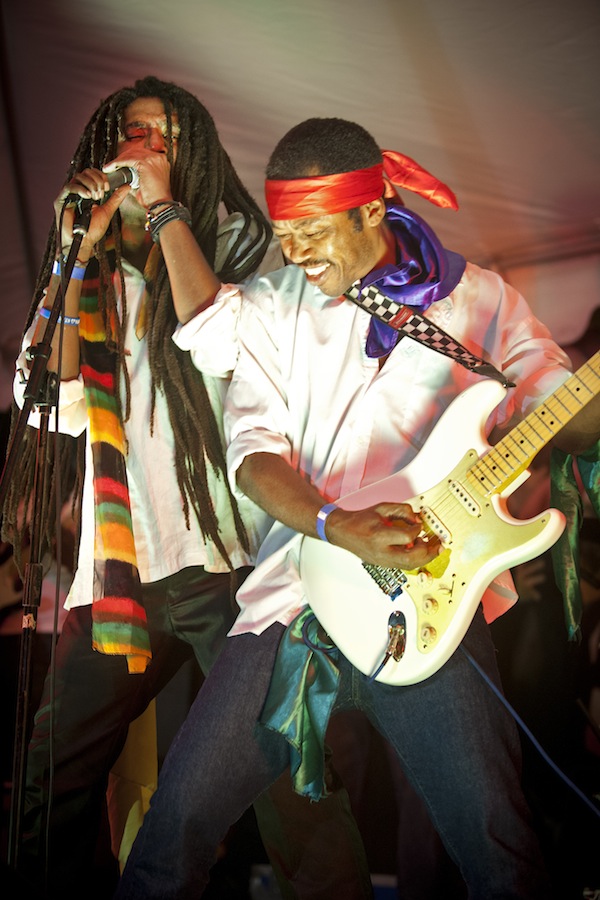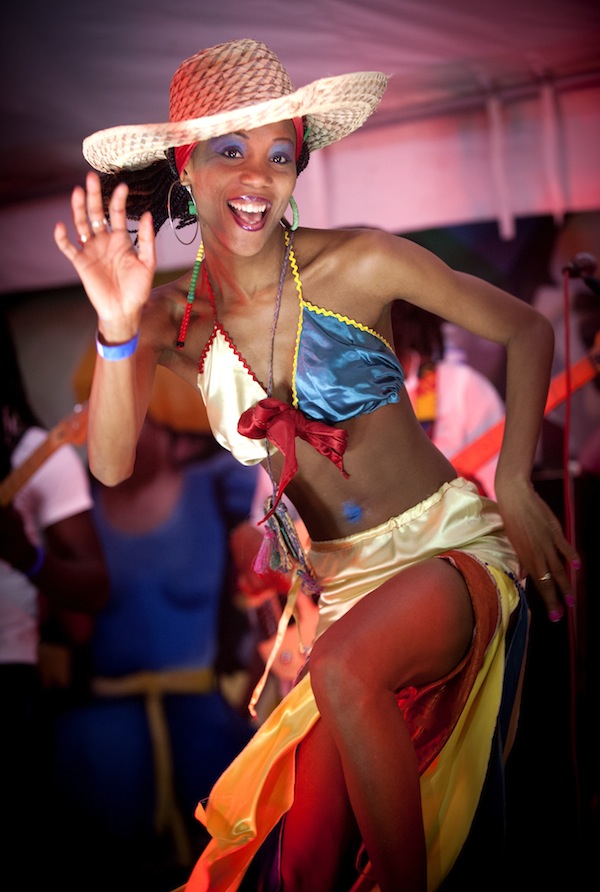
rasin (roots) legends Boukman Eksperyans at Big Night in Little Haiti
This month we have a very special Big Night in Little Haiti. May is Haitian Heritage Month and we are very proud to feature rasin (roots) legends Boukman Eksperyans . They are one of the most successful and well traveled Haitian bands to date. The band arrived in Miami after a 14 hour drive from Black Mountain Festival in North Carolina and were gracious enough to answer some of our questions below.
First, here is a little information about the band: Formed in 1978 in Port-au-Prince Haiti by Théodore “Lolo” Beaubrun Jr. and his wife Mimerose “Manzé” Beaubrun, Boukman’s name comes from the combination of two important influences on the band: the 1791 slave revolution at Bwa Kayiman led by voudou priest Boukman Duty; and rock legend Jimi Hendrix Experience. The band’s musical style takes traditional Haitian rhythms which rely heavily on bamboo instruments and mixes it with the sounds of electric guitar, bass and synthesizer. Within a single song, one hears Haitian rara, peasant songs, and songs of voudou ritual mixed in a blend of rock, blues, reggae, soukous, funk, R&B and hip hop. Since their start in 1978, the band has become internationally renowned for their revolutionary albums. In addition to tours, they have played alongside artists such as Wyclef Jean and Femi Kuti. Their 1991 album Vodou Adjea was nominated for a Grammy Award. The group won the prestigious award for best carnival song in 1990, with “Kè-M Pa Sote” (I’m not afraid). The song, which challenged Haiti’s military rule, became their most popular song and is still an all time favorite amongst fans, and was included on the Grammy nominated 1991 international debut Voudou Adjae. More than three decades later, they remain fresh and vibrant. The Rhythm Foundation: Could you tell me about the formation of Boukman Eksperyans? Boukman Eksperyans: When I first met Manze in July of 1978 I was coming from NY and had the chance to see Bob Marley and the Wailers live at Madison Garden. I felt this was the moment for me. I decided that we could do something positive with our culture. We were fighting against the stereotype they gave every Haitian, to hate their culture, to be ashamed of it. They told us that vodou is satanic, to reject it completely, reject ourselves or we are going to hell. We knew we could make the Haitians proud of their culture, and through music, we could deliver the message of Ginen: the message of Love, truth and justice. What you’re thinking, saying, and doing have to be One. The way of being in the Vodou!
TRF: How did you choose the name? Who was Boukman? BE: We have had the name of Boukman Eksperyans since the beginning. We were always talking about Boukman Duty’s legacy and what he did spiritually as a leader of the slave revolt, as a man who made unity between the tribes of Africa, Native Americans, Taino and Carib, mestisos and mulattos. It was Fanfan Alexis, our first guitarist, who said Boukman could be a good name for us and me and Manze looked at each other and said and felt this is it. We said Boukman Eksperyans, and we knew we found it or we knew the Spirit sent the name for us. Boukman Duty is a prophet, a great spiritual leader who was born in Jamaica as slave during the mid 18th century, and was sent to Haiti, (at that period of time Haiti was called St. Domingue). Maybe he came with his master, nobody knows. Some historians said that he was a commander while others say that he become a maroon chief. He was a Vodou priest (Vodou means Spirit, Energy, Mystery) and also an Imam or Mori (priest), and his influence was great on everybody. Even Toussaint Louverture, who became the chief of the insurgents, followed him after the uprising.
TRF: What other musical influences did Boukman have beside vodou and reggae? BE: When we started Boukman in 1978, we were the first group to play the way we did, making a fusion between rock, reggae, jazz and other genres with our culture, the vodou. It was the first time we played vodou rythme like it is in the temple. We don’t use it only as folklore but as the spiritual dynamism. We want to represent the force of our culture like it is!
TRF: The late 80s and early 90s were a time of military unrest and governmental crackdowns. Is your music influenced by the politics of this time? BE: The beginning of the 80′s was difficult for the most Haitians because we were under dictatorship. The state was built to be against the Haitian people. It did not accept our culture; it denied it and made us reject the peasant people, our culture, the vodou, and the Creole language. You felt that in school, at work, everywhere, you had to be a “good Westerner” and speak French fluently. We had some difficulties with the authorities because we were preaching the Ginen, the path of Jesus. As we were not from any denomination or any religion, they found us dangerous, and forced us to leave Ouanaminthe. It was a ultimatum so we left in 1984 for Port-au-Prince with my family. I can tell you this: our music influences politics, it is not politics that influence us. We don’t have any political base or party or clan. We follow the path of Ginen, and we don’t care about their big guns. There is nothing like Love and truth and it’s where we put our heart, in the spirituality. That’s why we have no choice to tell anything but the truth. Ginen is a way of life!
TRF: The government was so extreme that your 1990 song “Kè-M Pa Sote” was banned from Haitian airwaves. Could you tell me about the song? Why do you think it was banned? Was the government threatened by it? BE: In January of 1990 we were under military dictatorship, General Avril was in power. When we went to the recording studio to record that song, we never imagined that it would be a super hit and a tool in the hand of Haitian people; they kept playing the music without any interruption. Of course the military became angry. As we don’t have any political attachment, they don’t how to deal with us. The military had tried to ban the song from radio, but they failed; Haitians played the song even more. We then had a surprise visit from General Avril at a concert at a schoolyard with at least 10,000 people. The big gate of the school was suddenly open and the military appeared with General Avril. He approached to the stage where we were already on stage preparing to play “Kè-M Pa Sote”, he shook my hand and asked “Se balenjo sa?” “Is this the balenjo,” I respond “wi se balenjo yo sa” “Yes, we’re balenjo”. Balenjo means Ginen, people who look for the Self, who live in Love, truth and justice as principle of their life. We played “Kem pa sote” and the General stayed to listen.
TRF: Did you have any trouble after this? BE: After “Kè-M Pa Sote” and the coup d’état against Aristide at the end of 1991, we wrote a new carnaval song called “Kalfou Danjere”, “The Dangerous crossroads” and the military became very angry with us. Once they released tears gas at a concert we played for students with more than 10,000 people in attendance. We had also a lot of trouble in 94 because we did conference against the repression and their tonton macoute called Fraph. After we went on tour in Europe, the US consulate prevented us from entering because of the embargo they put on Haiti. We were blocked in London and we got a big help from Chris Blackwell who sent us to Jamaica where we stayed 4 months working on a new album called “Freedom Let’s Take It”.
TRF: You have played many shows in the major world music circuit. Can you tell me about your experience playing at Red Rocks amphitheater in Colorado and Jazz Fest in New Orleans? Do you have plans to play other big festivals or shows? or do you prefer smaller more intimate shows? BE: In 1990 we were nominated for a Grammy Award for “Vodou Adjae” and we have been to many festivals all over the world. We are just coming from a big festival in North Carolina, the Black Mountain Festival where we did a lot of workshops on drums and dance. Next year we’re going to do New Orleans Jazz Festival again which we played two years ago as well as Montreal Jazz Festival again. We have also done Summer Stage, Central Park, Womad Festival in Seattle, London, Madrid-Extramadura, Vancouver Folk Festival, Calgary Folk Festival (July 2014), Reggae on the River, Bumbershoot Festival, the biggest festival in the US, Roskilde Festival in Denmark, the biggest in Europe, Africa Oye in Liverpool every two years… And many, many more I cannot remember. We have also played in many universities like Princeton University, University of Michigan, North Western University in Chicago, Duke University, Columbia University….
Before Boukman Eksperyan’s show on Friday at Big Night in Little Haiti, they leave us with a message: Kenbe la, Keep the faith.

Recent Content
-
Artsarticle ·
-
Artsarticle ·
-
Artsarticle ·
